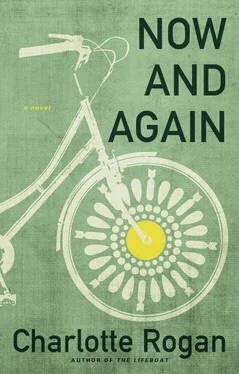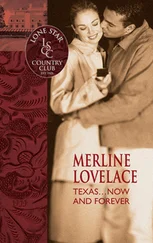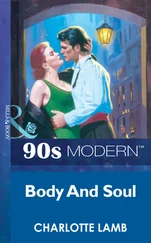“This is a war zone,” said Nate. “What did you expect?”
When the wind died down, it was hot under the heavy gear, and the rocky terrain made the going difficult, but still they put one foot in front of the other, three feet per step, 1,312 steps per klick. In the distance, Will thought he saw a cloud of thicker dust rising skyward, as if a vehicle was coming toward them, but then the wind picked up again and there was dust everywhere, and anyway, whatever he thought he’d seen was obscured by the brown crust on his goggles and also by the brow of the second hill.
“Nah,” said Nate when he mentioned it. “How would a vehicle get up here over all these rocks?”
“What is it, then?”
“Hell, I’m saying it’s third squad. The sergeant said they found the helo.”
Will worked the controller, hoping he could get the bird to launch itself if it was grounded, but Polly wasn’t moving. “I wonder what the deal with Polly is.”
“I hope she’s okay,” said Nate.
The cloud of dust was bigger now. There was something there, and it was getting closer. “Yeah, it’s got to be third squad,” said Nate. He raised his field glasses to his eyes. “I guess they’re coming to help us out.” And then he said, “Holy shit,” and then he started to run, which was difficult on the rocky terrain. And then, for some reason, he stopped running and fell face down in the dirt, and Will’s first thought was, It’s a sniper after all.
“Hey, man, you okay?” He dropped down beside Nate before looking up to see what Nate had seen. He focused and refocused — far out and then closer in — registering that Nate wasn’t breathing and that he had a hole in his face and that he wasn’t as heavy as Will had expected him to be, but otherwise not seeing anything he hadn’t seen before, only hearing a low, motorized hum and thinking it was Nate, whirring back to life. Or maybe it was Polly, finally responding to the controller and lifting off. Where was Polly when he needed her? Where was his extra set of eyes and ears? And then he did see what Nate had seen: the swivel gun mount of a Groundhog coming up and over the second ridge.
Will said his cue word and felt the power surge through him — inward from his hands and upward from his feet — accompanied by a blast of heat in his groin. He experienced the resonating moment and visualized success. His adrenaline kicked in, right on cue, making time slow down, which gave him a split second to decide whether to run or take cover behind a nearby pile of rocks. His legs were ready, muscles tensed. He took a lead and tried to pretend he was stealing home. He could make it. He knew he could make it in any test between him and the player with the ball. Unless it was only luck that counted. Unless everything was due to chance. He wondered if the other soldiers were right when they said that it had all been set in motion long ago. In that case, it didn’t matter what he did.
Out of the corner of his eye, the rock pile dissolved into light and shadow, solid and void, suggesting a depression in the earth or a recess or cave. He adjusted his hold on Nate and pressed his lead foot into the ground. He visualized his parents cheering from the stands. He heard the coach shouting at him to run like the devil was after him, and he thought it probably was. He remembered the drill sergeant who had smoked him in basic, and he remembered that can’t was not an option. He hoped Tula was right that a person could change things. “Spider-Man,” he said on the chance that he could defy whatever destiny was hurtling toward him. Maybe he couldn’t, but maybe he could.
Beyond the world of this novel is another world of people who helped bring it to life — writers and thinkers who opened my eyes or caused me to question, soldiers who shared their experiences, experts who took care of the details of publication, and editors and early readers who understood what I was trying to do — or didn’t, which was helpful too. My heartfelt thanks to you all, particularly to Reagan Arthur and David McCormick, who were there from the beginning; and to Ursula Doyle, Terry Adams, Heather Fain, Matt Carlini, Betsy Uhrig, Shannon Langone, Carrie Neill, Susan Hobson, Bridget McCarthy, Emma Borges-Scott, Ayad Akhtar, Kevin Shushtari, Jami Attenberg, Melissa Sterry, Syndi Allgood, Graham Pulliam, and others who prefer to remain unnamed.
Special thanks go to Bruce Smart for the title; to Kapo Ng and Nico Taylor for the covers; to Kevin and Stephanie for the faith; to Nick for the insights on ethics, eternal return, and amor fati; and to Olivia for her sharp eye and even sharper opinions, as well as for sending me this, from Camus:
Maman must have felt free then and ready to live it all again. Nobody, nobody had the right to cry over her. And I felt ready to live it all again too. As if that blind rage had washed me clean, rid me of hope; for the first time, in that night alive with signs and stars, I opened myself to the gentle indifference of the world. Finding it so much like myself — so like a brother really — I felt that I had been happy and that I was happy again.
Charlotte Rogan studied architecture at Princeton University and worked for a large construction firm before turning to fiction. She is the author of The Lifeboat, which was nominated for the Guardian first book award and the International IMPAC Dublin Literary Award and which has been translated into twenty-six languages. After many years in Dallas and a year in Johannesburg, she now lives in Westport, Connecticut.












